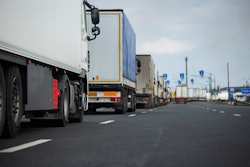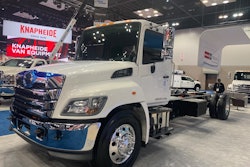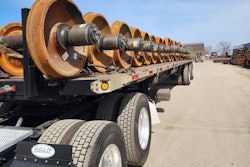Earlier this month, the Isuzu Motors broke ground on a huge manufacturing facility in Greenville County, South Carolina, and CCJ was invited to get an up close look before it ushers out new vehicles starting in 2027.
Join us as we take a look inside and out.
Contents of this video
Speaker 1:
This week in a special 10 44, we go on location to Isuzu new manufacturing facility in Piedmont, South Carolina. Hey everybody. Welcome back. I'm Jason Cannon and my co-host Matt Cole, is on vacation. Earlier this month, the Isuzu Motors broke ground on a huge manufacturing facility in Piedmont, South Carolina, which is in Greenville County, and CCJ was invited to get an up close look at this facility before it ushers out. New vehicles starting in 2027, join us as we take a look inside and out. Located in Piedmont, South Carolina, the plant sits on more than 200 acres and represents an investment of more than $280 million that will create more than 700 new jobs in the area. As Isuzu began searching for a new US production site more than two years ago, the new facility will consolidate production, vehicle preparation and logistics operations under one roof, enhancing efficiency and supporting Isuzu's North American growth plans. It will soon replace Isuzu assembly work that currently takes place in Charlotte, Michigan. Sean Skinner, president and chief executive officer at Isuzu commercial Truck of America said the move to South Carolina also makes a lot of logistical sense.
Speaker 2:
Right now, we bring stuff in into the west coast of the United States. It has to be railed across the US and you bring it into Tacoma and to also Los Angeles. The thing that we'll have here is you'll have the Port of Charleston that is closer. There's a lot of rail set up because of some of the people that have been here previously, so it does reduce, I think some of what you have complexities with all of that, probably more than that. What it does allow is you've seen from the size of the facility and the area that we have around here, it allows us to put everything in one area because when we were in Michigan with what we have set up there, while it's worked really well, we've kind of outgrown the ability and we've had to have buildings in certain parts of town.
So you have, it's kind of fractured, and this allows us to have everything in one area and will really allow us to grow our volume number one, but also do it in a way that's probably more effective with the way that we're able to utilize the space. That'll be in one spot right here. Storage will be right on site, and you won't be having to worry about bringing things in from all over the place. So not only from the standpoint of logistically getting the things to that area, keeping them around the facility or the campus is going to be much easier too. So it does help with all of that. So really what it came down to was as we looked at getting to that 50,000 unit goal longer term, what we needed to look at was the ability to not have it so fractured like you had in Charlo, and I'll give you a little story.
When we opened up Plant five there, this is 2011, we didn't have gas production from 2009 to 2011 because during GM's bankruptcy, they had assembled the end gas force in Jamesville, Wisconsin. We had to find a new partner in that, and we interviewed, did a lot of our work to find somebody that would work well with us, and we landed on Spartan Plant Five was where we reassembled that, and our goal was to get to 4,000 units. Our hope in 2011 was that eventually we'd get to 4,000 units. In 2023, we did over 20,000 units in that plan. Well, my joke is we were keeping it kind of bound together with duct tape and bailing wire. It just became really hard because the facility's small. Like we said, we had everything in different areas. So I think as we were looking at how are we going to make sure that we have the ability to get to that level, it was something that we felt needed to be our own investment.
What it does allow us to do is when you're doing the assembly on your own, you have direct control over what happens on the assembly line. If you're contract assembling with somebody, you can recommend and work with them, and they've always been gracious about doing that, but ultimately it does give us total control of our portfolio, not only from a standpoint of having it all under in one area. You've seen that there's space here for us to grow into, and even with the plant, they showed that there's going to be extra space there. It allows for us to get to that goal without having to try and piece it together piecemeal. I think that was probably the primary objective there. From the standpoint you've heard our own control. I think that that just allows us to make sure that there's a level of consistency with not only the plants that are in Japan, but the other ones that we set up globally, that we do the assembly of the product, that there is a consistent methodology and it's one that we're responsible for. So anytime you're working with somebody, you work great together, but when you have it on your own and you can make decisions that regardless of what it's going to mean as far as cost to the assembly, if we feel it's really important to the quality, it's a decision that we can make towards that, not one that somebody else is making for us.
Speaker 1:
The Piedmont assembly line will feature a variable model, variable volume production line that will assemble internal combustion engine vehicles and electric vehicles. The plant will produce the company's N Series Gas, N Series electric and F series diesel trucks, and will have a production capacity of about 50,000 units annually by the end of this decade. Greenville County already has a large automotive production base that includes Michelin, BMW, and zf. South Carolina is also home to 16 technical colleges, which South Carolina Governor Henry McMaster pointed out consistently churn out the workforce that supports the state's manufacturing base. Isuzu expects to kick off initial production in 2027 with further expansion in 2028. That's it for this week's 10 44. You can read more on ccj digital.com. While you're there, sign up for our newsletter and stay up to date on the latest in trucking industry news and trends. If you have any questions or feedback, please let us know in the comments below. Don't forget to subscribe and hit the bell for notifications so you can catch us again next week. I.









